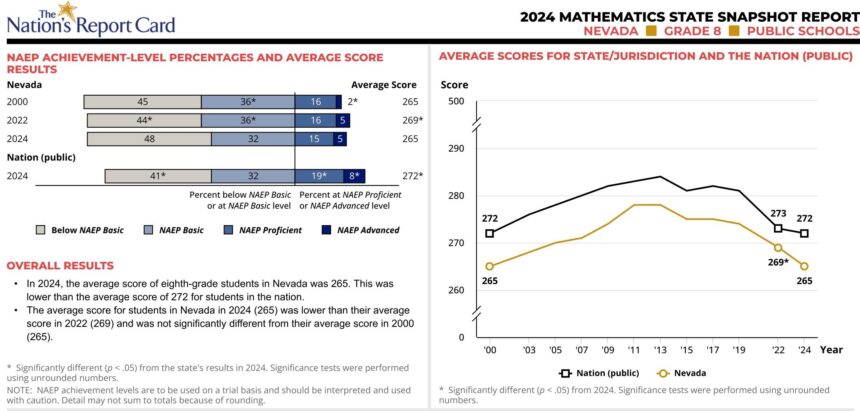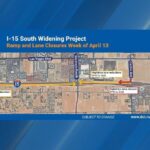Nevada educators, parents, and policymakers are bracing for a challenging year as the latest national assessment results reveal widespread declines in student performance across the country. The National Assessment of Educational Progress (NAEP), often referred to as the nation’s report card, has shown decreases in key academic areas, underscoring ongoing struggles within the education system amid pandemic-related disruptions and evolving learning environments. As Nevada awaits the release of its own state-specific scores, questions loom about how local schools will measure up and what steps will be necessary to address the setbacks reflected in this nationwide trend.
Nationwide Decline in Student Performance Raises Concerns Among Educators
The latest data from the national assessment reveals a worrying trend, as scores in core subjects such as math, reading, and science have declined in nearly every state. Educators and policymakers are sounding the alarm, highlighting that the drop could have long-term implications for student preparedness and the future workforce.Contributing factors cited include ongoing disruptions caused by the pandemic, increasing classroom challenges, and a widening achievement gap among under-resourced communities.
In particular, Nevada’s educators are bracing for the release of their state results, anticipating another challenging year amid attempts to bolster academic recovery. The concern is heightened by recent performance reports from neighboring states, which show consistent declines:
- Math proficiency dipped by an average of 5% nationally.
- Reading scores declined by 3%, marking the first drop in a decade.
- Science achievement showed the steepest fall, with a 7% decrease reported.
| State | Math Score Change | Reading Score Change | Science Score Change |
|---|---|---|---|
| California | -4.7% | -3.2% | -5.6% |
| Arizona | -5.3% | -3.5% | -6.9% |
| Utah | -3.9% | -2.8% | -6.5% |
| Colorado | -5.1% | -3.1% | -7.0% |
Nevada Schools Brace for Impact Amid Anticipation of Latest Assessment Results
As the nation grapples with new educational challenges, the latest Nation’s Report Card reveals troubling declines that have Nevada educators and administrators on high alert. Preliminary data from several states have shown a consistent downward trend in student performance across key subjects such as mathematics, reading, and science. Schools in Nevada are now preparing for the imminent release of their own assessment results, bracing for what many anticipate will be a reflection of these broader national setbacks.
Districts are already mobilizing resources to support students and teachers, focusing on targeted interventions and bolstering remedial programs. Key strategies being discussed include:
- Increased tutoring and after-school programs to address learning loss
- Enhanced teacher training on adapting lessons for diverse learning needs
- Strategic use of technology to personalize education pathways
- Community partnerships to offer additional educational support
| Subject | National Change (%) | Nevada’s Anticipated Trend |
|---|---|---|
| Mathematics | -3.2% | Likely decline |
| Reading | -2.7% | Potential stabilization |
| Science | -4.0% | Sharp decrease expected |
Experts Highlight Key Factors Behind Drop in National Academic Scores
Educational leaders and analysts attribute the nationwide decline in academic performance to several converging issues.Key among them is the prolonged disruption caused by the pandemic, which has led to significant learning loss, especially in foundational subjects like math and reading. Additionally, experts point to increased socio-economic challenges, such as food insecurity and limited access to digital resources, which have disproportionately affected underserved communities. These factors, combined with teacher shortages and elevated stress levels among students, are believed to have created a perfect storm undermining recent academic outcomes.
Other major contributors highlighted by specialists include:
- Curriculum disruptions and shifting testing standards that have affected student preparedness.
- Reduced instructional time due to hybrid or remote schooling models.
- Variability in district-level support and resource allocation.
- Psychological impacts such as anxiety and disengagement affecting student focus and motivation.
| Factor | Impact Level | Primary Affected Group |
|---|---|---|
| Learning Loss | High | Elementary Students |
| Teacher Shortages | Moderate | All Grade Levels |
| Access to Technology | High | Rural & Low-Income Families |
| Mental Health Stressors | Moderate | Middle & High School Students |
Strategic Recommendations for Nevada to Address Educational Challenges and Improve Outcomes
To counteract the worrying downtrend in student performance, Nevada must prioritize targeted interventions that address specific educational gaps. Investments in early literacy programs and STEM initiatives can foster foundational skills and enthusiasm for lifelong learning. Moreover, expanding access to professional growth for educators ensures that teaching strategies remain innovative and culturally responsive, equipping teachers to meet diverse student needs head-on.
Policymakers and stakeholders should also consider implementing community-driven solutions that involve families, local businesses, and nonprofit organizations. This approach promotes shared duty and creates a robust support network for students outside the classroom. The following table outlines key strategic focus areas with corresponding action points:
| Focus Area | Action Points | Expected Impact |
|---|---|---|
| Early Childhood Education | Expand preschool access; enhance literacy campaigns | Stronger reading skills by Grade 3 |
| Teacher Support | Continuous training; retention incentives | Higher teaching quality and stability |
| Community Engagement | Partnerships with parents and businesses | Enhanced learning environments; increased resources |
Future Outlook
As Nevada awaits the full release of the latest Nation’s Report Card results, education leaders and policymakers face mounting pressure to address the widespread declines highlighted in preliminary data. The drop in student achievement across multiple subjects underscores the ongoing challenges within the state’s education system. Moving forward, stakeholders will need to collaborate on targeted interventions and innovative strategies to support students and reverse this troubling trend. The coming weeks will be critical as more detailed scores become available, offering a clearer picture of Nevada’s academic standing and informing the path ahead.








